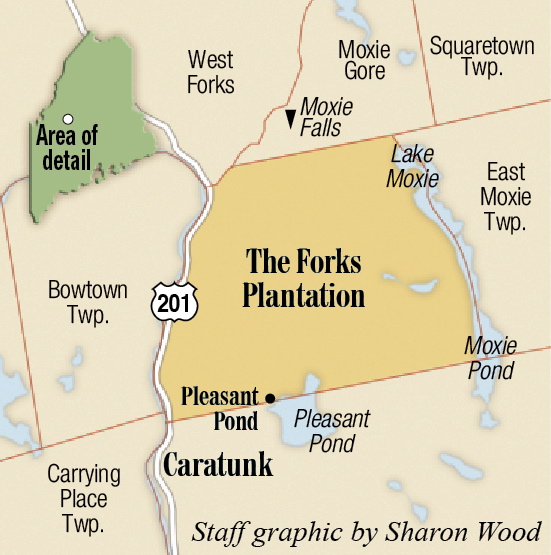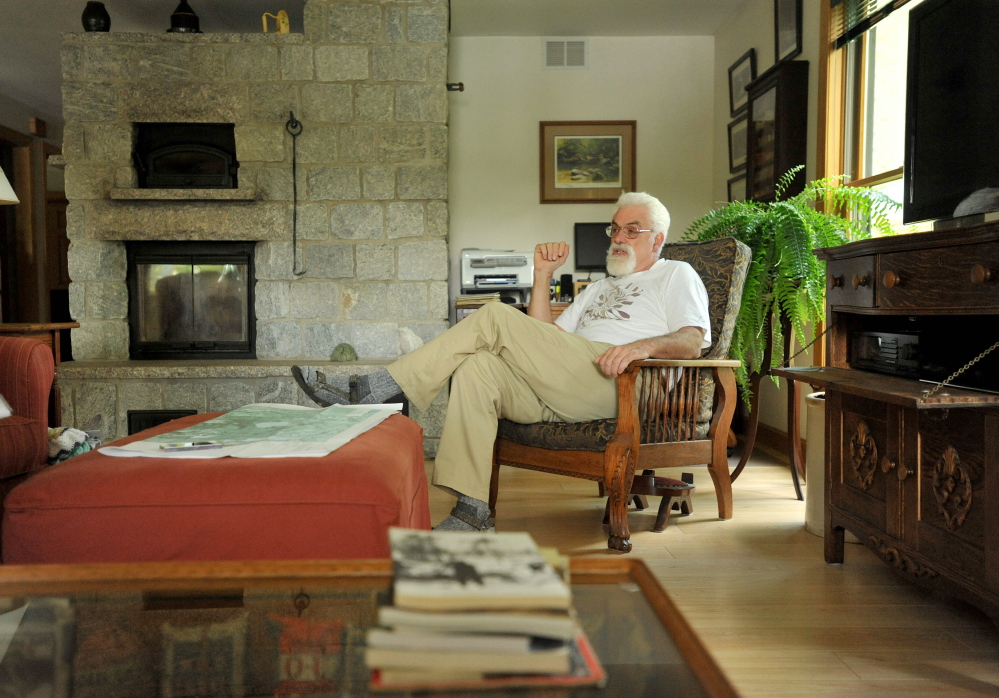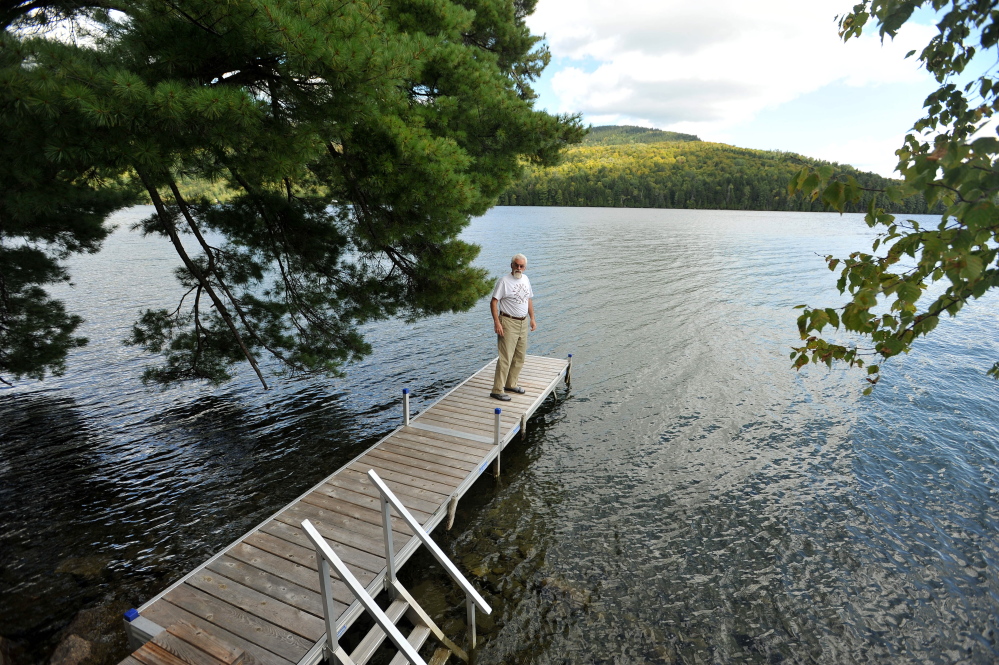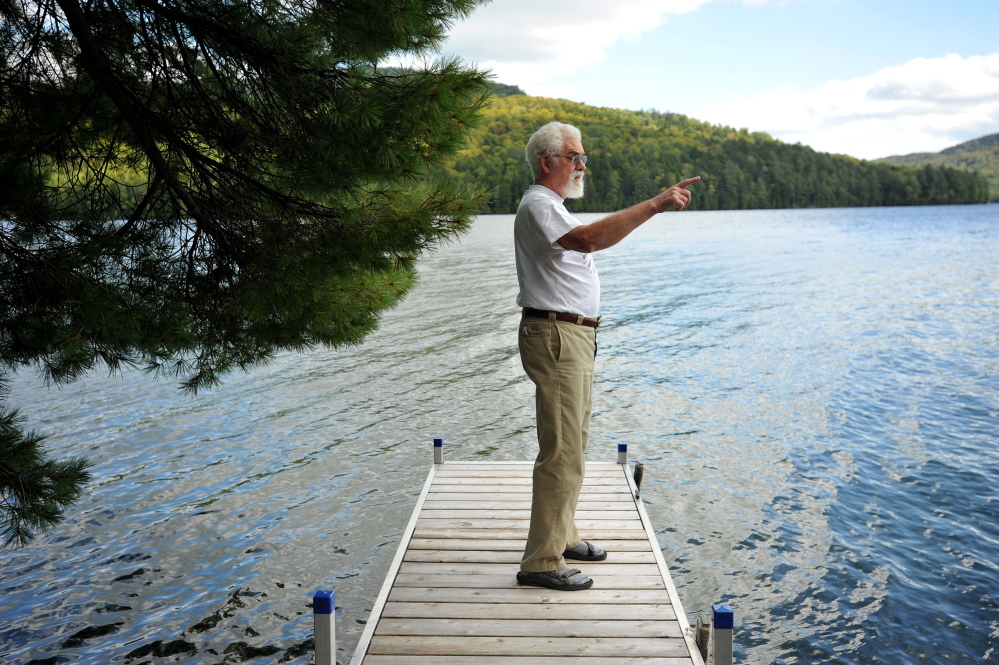THE FORKS — Craig and Donna Dickstein use weekly trash pickup provided by Caratunk, pay property taxes in the town and if there were an emergency would probably rely on the town’s services.
The closest roads are Caratunk roads and they’re the ones the Dicksteins routinely travel.
In fact, the only way to get to their area around Pleasant Pond is by Caratunk roads.
The dead-end dirt road that leads to the house is not maintained by either town, something the Dicksteins compensate for in the winter by skiing or snowshoeing about an eighth of a mile to get to their driveway in central Somerset County.
And Donna Dickstein is even a Caratunk selectwoman.
But the town line runs through their home and Dicksteins technically live in both the town of Caratunk and The Forks, which is a plantation.
In August, Craig Dickstein presented The Forks board of selectmen with a plan that would allow the people who live in the North Cove area of Pleasant Pond, in The Forks but only accessible via Caratunk roads, would be able to secede from the plantation. They proposed using a process outlined in Maine state law that explains how a portion of a community has the right to leave if they are unhappy with the way the government works.
But because of a technicality — the law is phrased such that it only includes municipalities in the secession process and not plantations like The Forks — the group couldn’t proceed with the selectmen.
“I was a little disappointed,” said Dickstein, 65. “We can’t possibly proceed with secession until there is a revision in the law, and if the revision doesn’t happen, that’s it. It’d be dead in the water.”
The group now seeks a change to the law, which would require drafting a bill, a process that could take many months. The offices of two local lawmakers are already looking into proposal, but aren’t definitive about whether a bill would happen.
“There is interest in having this law changed but it’s not a decision we would consider until after November,” said Meghan Russo, legislative aid for state Sen. Rod Whittemore, R-Skowhegan, who represents District 26. “If the senator is lucky enough to get re-elected, he will sit down at that point and go over all of the requests that constituents have made to him for various bills, looking at why the law is the way it currently is and what affect a change would have.”
State Rep. Larry Dunphy, R-District 88, who represents the area said his office is also researching the issue, but it is too soon to tell whether new legislation would work.
“I think it needs to go to a vote,” said Dunphy. “Obviously if we put in legislation we wouldn’t know what it should look like because we don’t know what their goals are at this point. Is it simply to secede? Does The Forks have to release them?”
The movement to secede began in the spring of 2013, when a group of disgruntled taxpayers in North Cove circulated a survey asking residents whether they would prefer to be part of The Forks or Caratunk. The results showed that about 80 percent of the 41 households who returned surveys supported leaving, according to Dickstein and another resident, John Beauchamp, who conducted the survey.
The tax rate in Caratunk is $6.40 per $1,000 of assessed value, while the tax rate in The Forks is $8.35. That means that the property taxes on a $150,000 home in Caratunk are $960, while in The Forks they are $1,252.
On the other side of the debate is a group of residents who don’t want to leave The Forks, like Stephen Small, a seasonal resident who splits his time between the pond and his home in the Somerset County town of Bingham. He says The Forks provides more of a sense of community, including its own fire department and rescue services, that the plantation is more supportive of property owner requests and needs and that the difference in tax rates is not that significant.
Small and others have proposed an ATV trail as a way to better connect the pond to the rest of The Forks. Now, it’s about a 30-mile round trip for residents of the pond to get to the town transfer station and other services in The Forks that they must access via Caratunk roads. A more direct but less reliable route crosses over about seven miles of private land owned by Wagner Forest Management, a forestry company.
“I think it’s kind of foolish,” said Small. “Everything has been laid out the way it is. We’ve always been in The Forks. I’ve always had friends in that area, it’s just the way it is.”
First Selectwoman Sandra Thompson of The Forks said the plantation has no comment on secession.
But in Caratunk, First Selectwoman Elizabeth Caruso said the town is open to accepting the residents of North Cove as part of their town.
“When they drew the town lines, it made no sense,” said Caruso. “The people that came to the board said that due to the geographic layout and its road access to North Cove, Caratunk and its residents have a closer relationship than The Forks does. They want to help bear the costs of all the vehicular traffic that The Forks places on our roads and it makes sense.”
Caruso said she fields calls each year from real estate agents, repairmen, utility companies and emergency service personnel who are confused by residents directing them to come to Caratunk when they have addresses in The Forks.
“If they say they live in The Forks, there is no accessible way,” said Caruso. “It must confuse The Forks residents enough because they’re telling attorneys and Realtors and Fairpoint that they’re in Caratunk. I get those calls every month.”
It’s not clear why plantations — of which there are about 30 in the state — are exempt from the secession process, which was established by state law in 1995. That followed a spurt of efforts in places like Biddeford Pool, Long Island and Peak’s Island to secede, said Beverly Daggett, who was chair of the State and Local Government committee during the 117th Legislature, the committee that reviewed the law almost 20 years ago.
“I just don’t know why they weren’t included,” Daggett said of plantations. “Probably because it wasn’t an issue. The movement was largely related to towns because there had been several islands around Portland where a handful of people were looking to get out from a property tax burden. But it’s very unusual and I don’t think plantations were part of the issue at the time.”
Dickstein said he plans to pursue a change with the help of state lawmakers, but if the law can’t be revised he isn’t sure what will happen.
“I see it as a disenfranchisement,” he said. “Why would you exclude a part of the state from doing something the rest of the state can do?”
Rachel Ohm — 612-2368
Twitter: @rachel_ohm
Send questions/comments to the editors.








Success. Please wait for the page to reload. If the page does not reload within 5 seconds, please refresh the page.
Enter your email and password to access comments.
Hi, to comment on stories you must . This profile is in addition to your subscription and website login.
Already have a commenting profile? .
Invalid username/password.
Please check your email to confirm and complete your registration.
Only subscribers are eligible to post comments. Please subscribe or login first for digital access. Here’s why.
Use the form below to reset your password. When you've submitted your account email, we will send an email with a reset code.